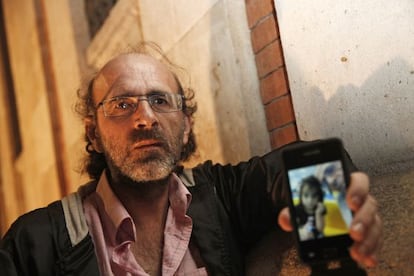Call to tackle “alarming” number of children being whisked abroad
In 2011, 136 minors were taken out of Spain without consent of one of the parents

"I don't want my daughter, when she grows up, to say: 'You never came.'" Antonio Blanco, a 50-year-old music teacher, had to travel to Japan this summer to meet up with his six-year-old daughter. His ex-wife took her back to her native country in 2009, despite a court order preventing the child from leaving Salamanca, where the family lived. Blanco's fight with his former spouse to establish visiting rights has been long and arduous, and cost him savings and two years of his daughter's youth.
His case is becoming ever more common. In 2011 the Justice Ministry dealt with 136 return orders for children taken abroad without the permission of one of their parents. The figure is "alarming," said the president of the General Council of the Judiciary, Gonzalo Moliner. And it is a figure that is steadily rising, from 41 cases in 2001, to 70 in 2007 and 95 in 2008. It could be even higher: the ministry only deals with cases where a child has been taken to a country signed up to the Hague Convention. Japan is not among these.
The rise is attributed to the increase in marriages between different nationalities in Spain during the boom years. The Hague Convention states that a child should remain in the place of habitual residence. "Once it is established that it is Spain, through school or medical card registries, we require judicial authority from the other country," says the ministry. "But justice tends to be very protectionist over its own nationals." Of the 136 cases in 2011, only 20 were resolved with a judicial order from another country for the return of a child to Spain. "If the other country involved is not a signatory to the convention, we can't do anything," adds the ministry.
It took Blanco a year to track down his daughter, a task he hired a private detective to carry out. However, no lawyer in Japan wanted to touch the case. When he was able to, in 2011, he went to Japan to see his daughter. "She asked who I was and I showed her some photos of us together," said Blanco. "I wanted to cry but I didn't think it was appropriate that the first thing she should see was a man crying so I stopped myself."
She asked who I was and I showed her some photos of us together"
After six months of legal wrangling, Blanco reached a visiting agreement with his ex-wife: six hours a week, in Japan. From 2016 he will be able to bring his daughter to Spain for one month per year. Despite his guardianship of the child being recognized by law, Blanco agreed to the arrangement. "What else could I do?" he asks.
Francisco Javier Forcada, a member of the Hague Convention international judges network, says Spain lacks judges specialized in the field. However, while "modernizing legislation," Forcada recommends expressly prohibiting one parent from taking a child out of the country without the consent of the other in divorce settlements. "It would avoid our legislation being misinterpreted in another country," he says.
Tu suscripción se está usando en otro dispositivo
¿Quieres añadir otro usuario a tu suscripción?
Si continúas leyendo en este dispositivo, no se podrá leer en el otro.
FlechaTu suscripción se está usando en otro dispositivo y solo puedes acceder a EL PAÍS desde un dispositivo a la vez.
Si quieres compartir tu cuenta, cambia tu suscripción a la modalidad Premium, así podrás añadir otro usuario. Cada uno accederá con su propia cuenta de email, lo que os permitirá personalizar vuestra experiencia en EL PAÍS.
¿Tienes una suscripción de empresa? Accede aquí para contratar más cuentas.
En el caso de no saber quién está usando tu cuenta, te recomendamos cambiar tu contraseña aquí.
Si decides continuar compartiendo tu cuenta, este mensaje se mostrará en tu dispositivo y en el de la otra persona que está usando tu cuenta de forma indefinida, afectando a tu experiencia de lectura. Puedes consultar aquí los términos y condiciones de la suscripción digital.









































